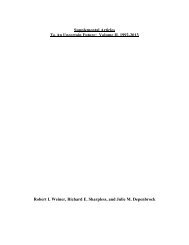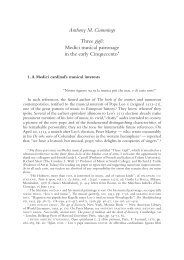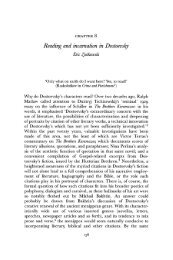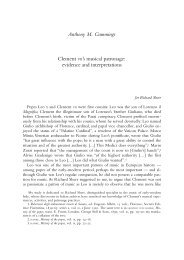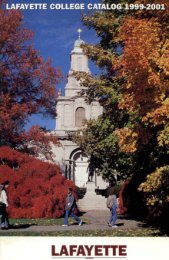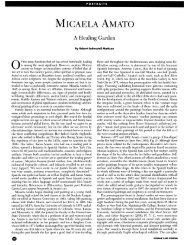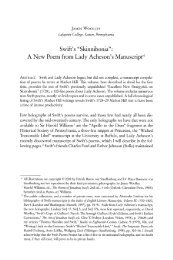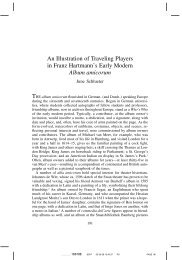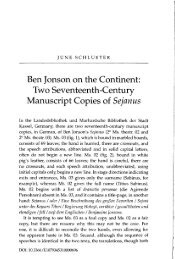Between Religion and Literature: Mircea Eliade ... - Lafayette College
Between Religion and Literature: Mircea Eliade ... - Lafayette College
Between Religion and Literature: Mircea Eliade ... - Lafayette College
You also want an ePaper? Increase the reach of your titles
YUMPU automatically turns print PDFs into web optimized ePapers that Google loves.
<strong>Eliade</strong> <strong>and</strong> Frye<br />
defense offered in his final work: "Nobody would attempt to study Islamic<br />
culture without starting with the Koran, or Hindu culture without starting<br />
with the Vedas <strong>and</strong> Upanishads: why should not a study of Western<br />
culture working outwards from the Bible be equally rewarding?"'34 Ide-<br />
ally, if the study of religion <strong>and</strong> literature is to develop into something<br />
broader than the study of Christianity <strong>and</strong> modern Western literature,<br />
which is what it mainly persists as today, it would behoove its exponents to<br />
follow the lead of historians of religions such as <strong>Eliade</strong> in striving to cultivate<br />
"the perspective of the whole," from which vantage Judeo-Christian<br />
literature would be seen as but one in a galaxy of (perhaps mythically<br />
relatable) literatures including those of Islam, Hinduism, <strong>and</strong> all the other<br />
cultures <strong>and</strong> religions of the world.<br />
A second directive is that scholars of religion <strong>and</strong> literature should try<br />
to balance their theological reflection on the texts they study with a more<br />
faithful scrutiny of the texts' inherent mythical structures, or of the texts'<br />
continuity with mythical structures. Tillich's classic formulation that religion<br />
is the substance of culture <strong>and</strong> culture the form of religion, provided<br />
several generations of critics with a key by which to discover expressions<br />
of ultimate concern in art <strong>and</strong> literature. Neither the validity of this theology<br />
of culture, nor its usefulness for the study of religion <strong>and</strong> literature, is<br />
to be questioned here. Nor is it to be overlooked that Frye has been seen<br />
as a closet evangelist who veiled his religious message in the guise of criticism<br />
or that <strong>Eliade</strong> acknowledged there was a theological dimension in his<br />
own scholarship.'35 Nonetheless, any theological claim about a literary<br />
text can only come from outside the text, <strong>and</strong> so it is perhaps now time for<br />
such claims to be based more firmly on the texts. Toward this end, the sort<br />
of myth criticism espoused by Frye <strong>and</strong> <strong>Eliade</strong>, despite the theological<br />
aspects of their own thought, might be employed as a complement to theological<br />
criticism in order to keep interpreters "honest"; what one<br />
intepreter perceives as a given work's religious or theological dimension<br />
might be seen by another as, in strictly literary terms, the end result of a<br />
long process of displacement of some archetypal, mythic theme.<br />
Finally, a recognition of the basic lines of kinship between <strong>Eliade</strong> <strong>and</strong><br />
Frye might urge scholars of religion <strong>and</strong> literature to reexamine their<br />
basic assumptions about the specific interrelationship between their two<br />
overlapping spheres of interest. The history of religions <strong>and</strong> myth criti-<br />
cism together direct our attention toward the mythic structure of literary<br />
134 Ibid., p. xx. Frye's point is exemplified by the organization of James Kritzeck's Anthology of<br />
Islamic <strong>Literature</strong>, from the Rise of Islam to Modern Times (New York, 1964; reprint, New York:<br />
Meridian, 1975), which opens with selections from the Qur'an.<br />
135 For example, Lynn Pol<strong>and</strong>, "The Secret Gospel of Northrop Frye," Journal of <strong>Religion</strong> 64<br />
(1984): 513-19; <strong>and</strong> Carol Olson, "Theology of Nostalgia: Reflections on the Theological<br />
Aspects of <strong>Eliade</strong>'s Work," Numen 36 (1989): 98-112.<br />
521



